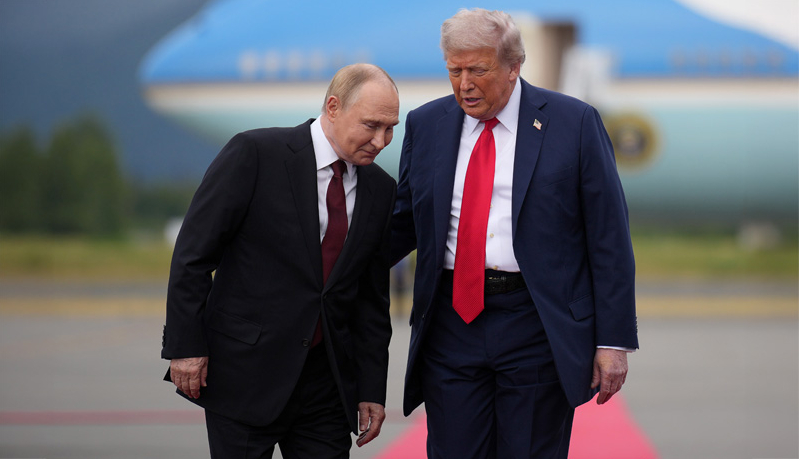
When Donald Trump strode across the tarmac at Joint Base Elmendorf–Richardson in Anchorage to greet Vladimir Putin, it felt less like diplomacy than a contest of egos before a watching world. One man, a steely ex-KGB officer bent on rewriting borders and restoring the “Motherland.” The other, a leader mocked as unserious by elites, eager to grasp the mantle of peacemaker—and, whether whispered or not, the glow of a Nobel Prize. It was ego versus ego. Yet the irony was plain: one man’s narcissism may destroy, the other’s might, paradoxically, save.
History is full of leaders whose sense of destiny was redemptive.
Sometimes self-interest and global interest align. Trump’s desire to prove his critics wrong and to play peacemaker may be more than vanity; it could become a pathway to peace. History is full of leaders whose sense of destiny was redemptive. Churchill, who once quipped, “We are all worms, but I am a glow worm,” leveraged his audacity to save Western civilization. Trump is no Churchill, but the instinct is the same: an ego that refuses smallness and, if properly harnessed, can serve something larger than itself.
As I travel and speak about the epidemic of low self-awareness, where only 13% of leaders see themselves accurately, I’m often asked if Trump intensified the problem. As a recovering people-pleaser, I tend to hedge, not wanting to alienate friends who share a different political perspective from me. But the truth runs deeper than one man. It is cultural. It is spiritual.
In The Narcissism Epidemic, Jean Twenge and W. Keith Campbell show how consumerism, social media, and indulgent parenting have fueled a rise in narcissistic traits. Jonathan Haidt’s The Anxious Generation further exposes how our addiction to constant validation has robbed young people of resilience and eroded space for reflection.
I would add: the digital culture, even the flattery of AI, has become the assassin of self-awareness. We are plugged in but disconnected from ourselves. Worse, we are distracted from the God who made us.
Productive versus destructive pride
The ancients warned us. In the Greek tale, Narcissus, entranced by his reflection, wasted away by the pond. Proverbs warns that “pride goes before destruction, a haughty spirit before a fall” (Proverbs 16:18). Leaders undone by ego are nothing new; the financial crisis showed how unchecked narcissism can collapse institutions and ruin lives. Put a destructive narcissist in the corner office (or the Kremlin) and chaos is guaranteed.
Not all narcissism is the same.
Yet not all narcissism is the same. Harvard’s Michael Maccoby once described “productive narcissists”: visionary leaders with oversized belief in their destiny, but whose drive aligns with society’s needs. Think about Lincoln’s “peculiar ambition,” Teddy Roosevelt’s reveling in the spotlight, Rockefeller’s philanthropic empire-building, and Steve Jobs as the visionary perfectionist. At times overbearing, even exhausting, but when their egos aligned with human need, they built rather than burned.
The Christian lens takes us further: the question is not ego versus no ego, but what the ego is yoked to. Pride left unchecked spirals inward; pride surrendered to God can become boldness for His purposes. Scripture is full of flawed, self-confident men—Moses, David, Peter—whose egos were redirected toward God’s mission.
By contrast, destructive narcissists like Putin descend into paranoia and self-absorption, unmoved by the slaughter of innocents. Trump, for all his bravado, seems different. Friends who work with him tell me his swagger masks a genuine disgust for war and senseless loss of life. If his ego pushes him to stop a war and prove the doubters wrong, then let him. Feed his vanity if it brings peace. Humanity has endured worse bargains.
The witness of ukraine
The war in Ukraine is not ultimately about one man’s legacy. It is about a people who have endured unspeakable loss with unimaginable bravery. On trips to Ukraine since the invasion, I’ve met families who told me, “We all sleep under the same blanket.” They meant it literally, huddling in basements under bombardment, and metaphorically, united in resistance. Tired and grieving, yet unbroken, they remind me of the early church: “All the believers were together and had everything in common” (Acts 2:44). They deserve security, sovereignty, and peace.
Narcissism, when disciplined by circumstance and aligned with human suffering, can become virtuous.
This is why even Trump’s fiercest critics, including Hillary Clinton, have said they would support a Nobel Peace Prize for him if, and only if, he can deliver a peace that preserves Ukraine’s territorial integrity and security guarantees. And they are not alone. Leaders around the world have already nominated him for his peace efforts elsewhere. That’s the irony: narcissism, when disciplined by circumstance and aligned with human suffering, can become virtuous.
The narrow path
The truth is that every leader carries a measure of narcissism. None of us is entirely free from pride or self-absorption. The Apostle Paul, once full of zeal and self-confidence, came to see himself through the lens of grace: “all have sinned and fall short of the glory of God” (Romans 3:23). Freed from the tyranny of image management, Paul no longer lived for the approval of others, or even for his own self-judgment.
Instead, he fixed his eyes on how his Creator saw him, performing for an audience of one. In this, he embodied what Tim Keller later described as the “freedom of self-forgetfulness”: the ability to turn ambition into service and confidence into humility.
What separates the destructive narcissist from the productive is not the absence of ego, but the direction it takes.
What separates the destructive narcissist from the productive is not the absence of ego, but the direction it takes. Left unchecked, it curdles into vanity; surrendered to God, it matures into service.
The best leaders I’ve studied, whether in boardrooms, battlefields, or the halls of power, channel their fierce self-belief into something greater than themselves. They are not above others, but among them: bold enough to act, yet humble enough to resist worshiping their own reflection.
The Alaska summit will be debated for years. Success or failure, breakthrough, or stalemate. But one thing is certain: it marks a beginning, not an end, to what could become peace in Ukraine. If Trump’s ego buys peace, then give him the Nobel. Let him preen. The world can live with his vanity; what it cannot live with is Putin’s devastating war.
Les T. Csorba is the author of the recently released book, AWARE: The Power of Seeing Yourself Clearly – Diary of a Corporate Headhunter, and was a former Special Assistant to the President for Presidential Personnel in the George H.W. Bush Administration. With over 30 years of experience in executive search and leadership consulting, he is an authority in self-awareness. He has been instrumental in shaping the next generation of corporate leadership in the energy, political, and nonprofit sectors.
A sought-after speaker and commentator on leadership, Les T. Csorba has been featured on FOX News, MSNBC, and CNBC with Maria Bartiromo. His insights on executive leadership, corporate governance, and talent development have appeared in Corporate Board Member magazine, Oil and Gas Investor Magazine, the Houston Chronicle, the Chicago Tribune, and USA Today. His expertise in leadership and governance makes him a valuable resource for keynote speaking engagements, boardroom discussions, and executive coaching. Beyond his corporate work, Les is deeply involved in philanthropy and education.
A graduate of the University of California, Davis, Les is the son of 1956 Hungarian refugees. He and his wife, Anne, have been married for 38 years and reside in Houston, Texas, where they enjoy time with their four children and seven grandchildren. Les is a long-time member of Grace Bible Church in Houston, Texas.






